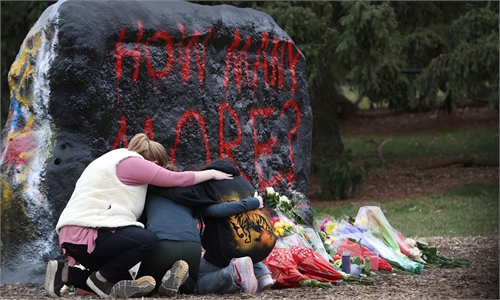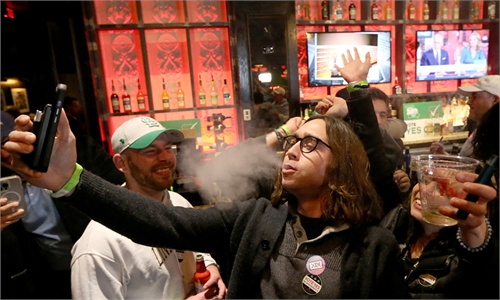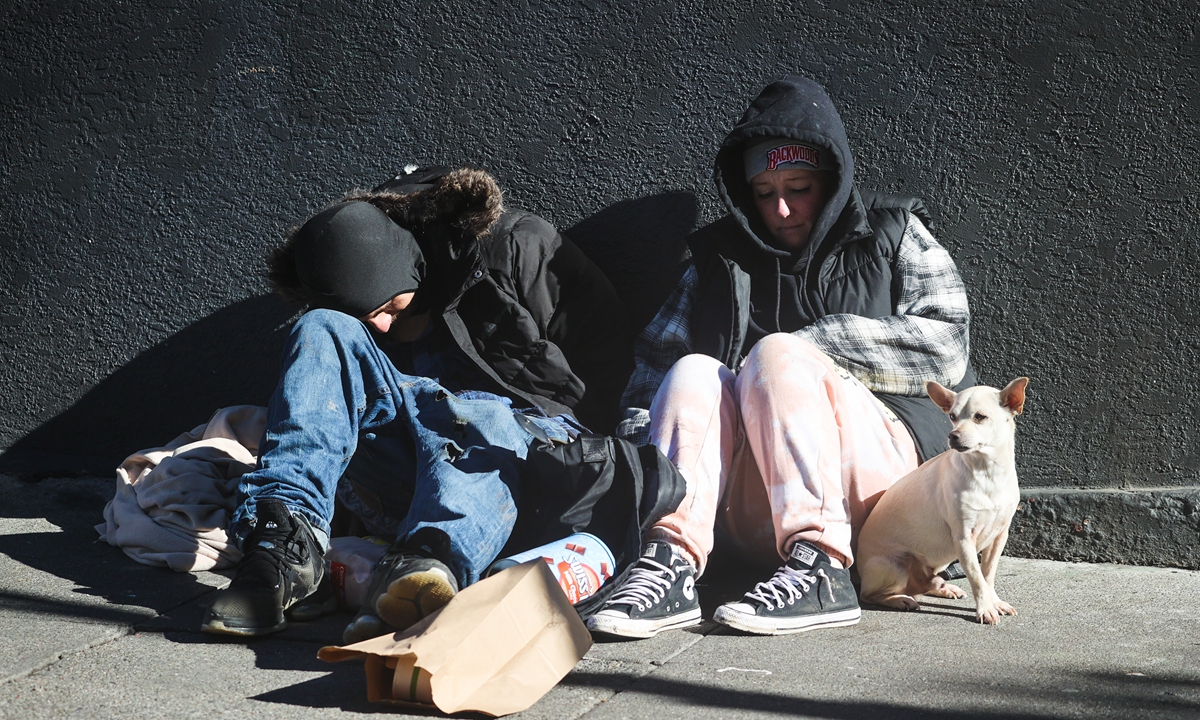
A homeless couple is seen on the sidewalk near City Hall in San Francisco, California on December 12, 2022. Photo: VCG
Editor's Note:While the US continues to buy into the dual fallacy of being the "city upon a hill" and a "beacon of democracy," the reality on the ground tells a different story - an increasingly large swathe of the American population struggles with drug abuse, growing worries around gun violence, an ever-widening economic gap between the haves and the have-nots, intensifying political polarization, more arbitrary detention of and hatred toward minorities... These sustained forms of unrest not only exacerbate social inequality and worsen domestic human rights conditions, but also expose the US' hypocrisy as it is unable to resolve its own urgent issues, yet never ceases to criticize other countries' human rights records.
The Global Times is publishing a series of articles that examine these and other sociopolitical and economic forms of chaos in the US. This is the third installment in the series which looks into the yawning wealth disparity in the country, the entrenched political and social causes behind it, and the implications of the problem.
Chinese American Judi Wang, 32, read Squeezed: Why Our Families Can't Afford America in 2018, the year she graduated with her master's degree in New York. She read the book mentioning the fact that even intellectuals like her in American society are tired of dealing with high childcare costs and harsh employment policies, but she still decided to stay in the US to work and live, a decision that she now much regrets.
"I used to think that everything in the book was just an exaggeration for the sake of publicity, and I used to believe I could get the life I wanted with my strength, but it turns out that I was very wrong," Wang told the Global Times.
Wang pointed out that during the pandemic, the US government went on a money-printing spree to deal with the crisis, but caused severe inflation with high prices that not only affected the American society's poor but also the middle class like her who works as an actuary.
"When we have to carefully calculate and stick to strict budgets every time we go to the supermarket to buy the same thing, the rich people are still splurging," Wang said.
Analysts pointed out that the US - the world's largest economy - is in fact the most economically polarized among Western countries, but the US government has failed to address this serious problem. The situation has become even more serious in recent years as the massive fiscal and financial stimulus measures that the US government adopted during the pandemic only helped billionaires further increase their wealth instead of helping the poor and middle class better deal with their living conditions.
Many people in the US now share Wang's agony as they are stranded in this huge wealth inequality. According to Federal Reserve statistics, the richest 1 percent of US households hold more than 20 percent of the national household wealth, a share that has continued to increase sharply in recent years. According to Fed statistics in 2021, the top 1 percent held a record 32.3 percent of the country's wealth, up from 23.6 percent in 1989, according to a report entitled "Rising Economic Polarization in the US: Truth and Facts," which was published by the Xinhua News Agency on February 23.
Meanwhile, analysts pointed out that despite the continued growth of the US economy over the last two decades, the middle class in the country has not expanded, but has instead shrunk significantly.
The share of American adults who live in middle-income households fell from 61 percent in 1971 to 51 percent in 2019. The share in the upper-income tier rose from 14 percent to 20 percent over the same period. Meanwhile, the share in the lower-income tier went up from 25 percent to 29 percent, read the Xinhua report.
"In China, all sectors of society share in the fruits of the country's progress. While in the US, the gap between the rich and the poor is stark. In many cases, just a street away, people live in two worlds, their children go to different schools, meet different classes of friends, and later work in jobs with vastly different pay," Wang noted.
"The US will give a few people the chance to soar to the top, but many more fall to the bottom. As Asian Americans, if we don't struggle, we completely lose the already few opportunities we obtain," she said.
Harsh reality
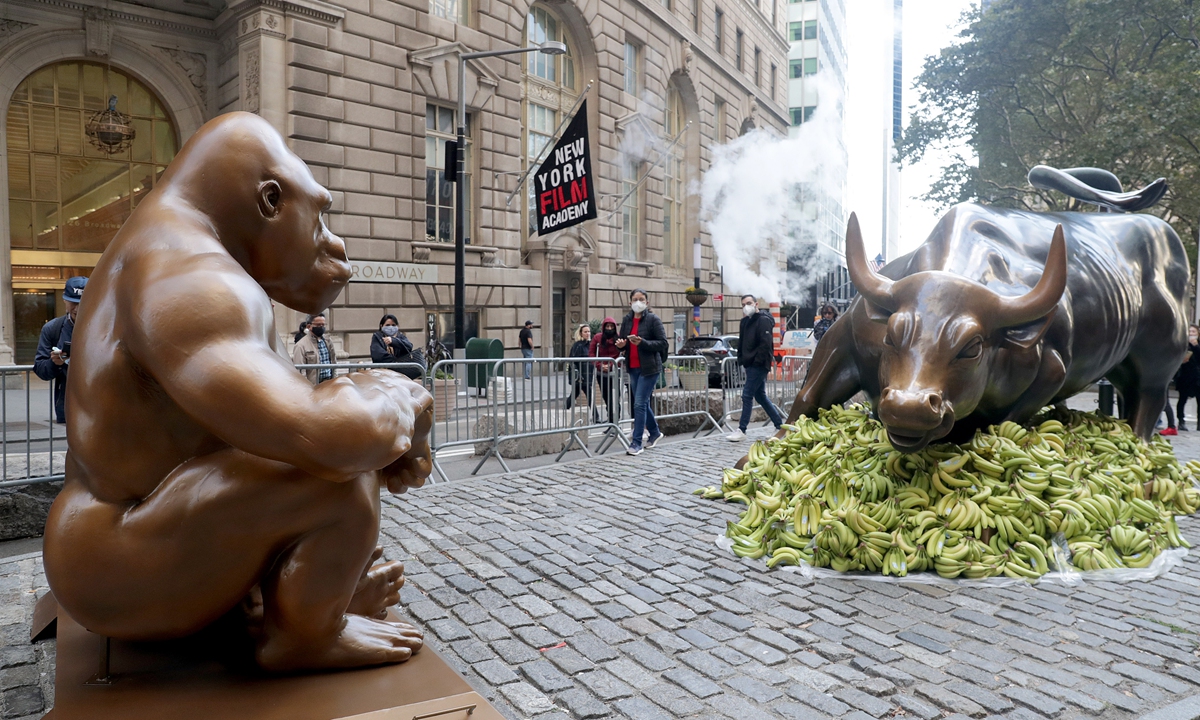
As part of the protest against rising economic polarization, a gorilla statue facing off a "Charging Bull" statue with the approximately 10,000 bananas is placed around in the Wall Street area in New York in October 2021. Photo: IC
The huge income inequality is not a new phenomenon in the US. Since the 1970s, the country has witnessed an increasing disparity in wealth. Hundreds of City University of New York staff members rally outside the university on February 27, 2023 calling for a new agreement that includes inflation-beating raises and other advances that help to protect academic quality. Photo: VCG
According to the World Bank, the US Gini coefficient went up from 0.353 in 1974 to 0.415 in 2019, exceeding the alarming level at 0.4 indicating a large income gap.
Since the 1970s, conservatism and liberalism have thrived in the US. Marketization and internationalization have been prioritized over equality, which has led to the current huge wealth gap. But the US government has only made oral pledges, rather than taking concrete measures to bring justice, analysts said.
The poverty issue in the US has never been effectively and properly addressed. The overall poverty rate in the country dropped by more than 10 percentage points between 1959 and 1969, and has lingered at around 12.5 percent ever since.
During the pandemic, the situation got even worse as it has caused massive job losses.
"During the COVID-19 pandemic, the rich got richer and the poor got poorer. Rich people invest in the stock market and grew considerably wealthy during the pandemic, but at the same time, many people lost their jobs and were living on unemployment checks which were not sufficient. As the economic situation veers toward recession, this problem shows signs of becoming serious right now," John Paul, a software engineer working at a renowned Seattle-based tech company, told the Global Times.
Paul has been very anxious lately, because his company started a drastic layoff scheme after the pandemic, and so far more than 10,000 people have been laid off globally. Although Paul works in a core department, he recently received information through the grape vine from many colleagues that his group, possibly including himself, needs to pack up and leave.
"Many people have lost jobs in tech industry and fewer people are buying property." For which, Paul's feelings were equally mixed.
The layoffs in US tech industry have been piling up recently. Google announced that it would lay off 12,000 members of staff; Microsoft plans to sever 10,000 jobs, and Amazon is expected to let go of more than 18,000 employees, according to a CNBC report.
These huge layoffs come with the country's high inflation and fears of a recession.
Previously, Paul had bought a $1.8 million villa in Seattle with a mortgage of nearly $70,000 a year, an expense he now feared he would not be able to afford if he were laid off. In such an event, he would be compelled to give up his property.
"Worse still, homelessness has increased in big cities due to economic polarization. There is an increase in property damage and theft due to this," he said.
It's been discovered that the pandemic hit the poor the hardest in the US. After collecting data from more than 3,200 counties in the US, and comparing the poorest 10 percent of the counties with the richest 10 percent, the Poor People's Campaign found that the poorer counties reported coronavirus death rates nearly double those in the wealthier ones. This heavy death toll in poor communities also highlighted systemic failures in the US addressing the issue of poverty.
It's noticeable that this huge wealth gap is closely linked to race. Black and Hispanic households earn about half the average income of white households in the country.
In the job market, racial discrimination is everywhere. The unemployment rate among Black and Hispanic workers is much higher than among white workers. Black professionals are poorly represented in high-earning professions.
Serious consequences
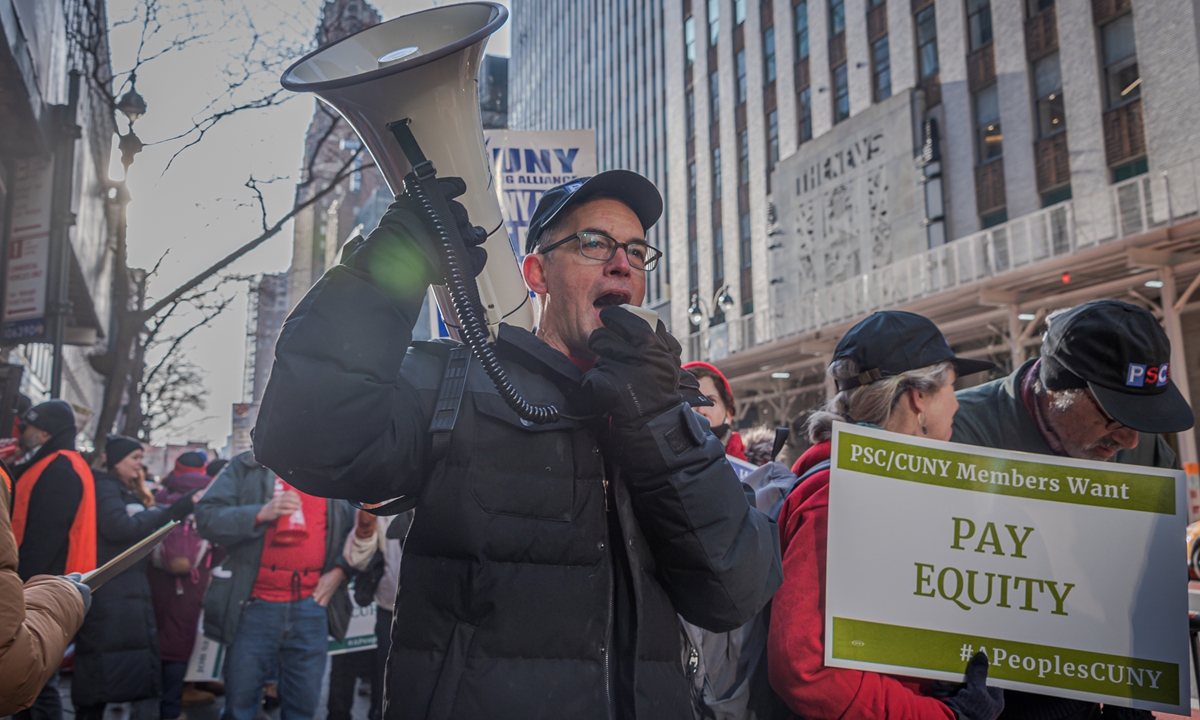
Since the start of the pandemic, Paul said he has had to spend a fortune on security installations due to the rise in crime around his block.
"Senators and public representatives kept talking about it on TV shows but the US government never thought to actually solve the problem," he said, sighing.
"The US government handled the economic situation during the pandemic by pumping in a trillion dollars into the economy but this helped only temporarily. As the pandemic ended, they started increasing interest rates which triggered high inflation. And also due to the Russia-Ukraine conflict, the economy started to go down badly. Due to this, fewer people are buying property and many people lost jobs in the tech industry," Paul said.
In 2022, several high-profile cases of violent crime which were believed to be committed by homeless people grabbed US media headlines.
In January, 2022, an elderly nurse was killed in Los Angeles by a homeless man and in the same month, a homeless man allegedly pushed a woman onto subway tracks in New York City, according to ABC news.
But at the same time, experts pointed out that many homeless people in the US also become the targets of crimes. A report by the US Department of Housing and Urban Development showed that more than 580,000 people were homeless in 2020, with 226,000 sleeping rough.
Experts warned that the human rights situation in the US is further worsening due to the increase in wealth inequality. The huge polarization between the rich and the poor in the country deserves serious attention.
Instead of blaming other countries, what the US should do is to face its own grim reality directly, address the problem of the huge polarization between the rich and the poor, and show true sincerity in solving the problem, analysts said.
